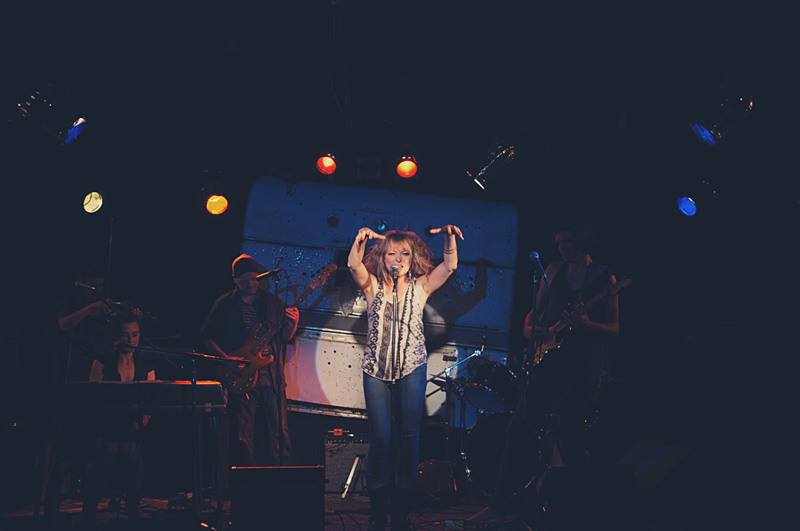A show about guns and violence is bound to attract controversy, but never more so than in the days following Ian Stawicki’s shooting rampage. Recall how after Columbine and 9/11, Hollywood delayed and re-edited several movies. Is it a sign of artistic courage or solipsism that Marya Sea Kaminski’s brutality-infused Riddled debuted as planned last weekend with nary a nod to the raw new context? Like most other aspects of the show, her motives are a muddle.
Outside the mock “club” at Hugo House’s loading dock, your ID is is checked and you’re given a drink ticket and a safety pin. Inside, a ’30s-gangster type (Paul Budraitis) grimly wields an M1 carbine, which you’re encouraged to hold and fiddle with. Then it’s into the club (designed by L.B. Morse), not quite as sticky as the Comet or Re-bar, but trying. On the walls are graffiti and beer cans strung like bandoliers.
Kaminski’s singer (simply “The Woman”) shares a tiny stage with a band calling itself Bonnie Clyde (actually Landlord’s Daughter, which plays a separate set after her show). Always an intense performer, Kaminski has feline eyes, heavily outlined, that seem to glow from behind. Her singer tells a story, interspersed with musical numbers, of an abusive, gun-loving, survivalist father and a damaging childhood under his roof. Then there’s the firearms-glorifying Bonnie Parker and Clyde Barrow stuff, derived from the singer’s poring over a stolen library book as a girl. There’s also a silent figure called “The Man” (Budraitis, masterfully emotionless), who represents a panoply of menacing male figures, but mainly a no-good lover and a cop.
What comes through here is the singer’s Stockholm Syndrome fascination with her physically abusive pa and her residual interest in guns and violence. Layered on top of Riddled are hurt-girl citations from Sylvia Plath’s poem Daddy and a musical chorus that goes “No yes no good bad right no wrong.” This is not an evening of moral clarity or dramatic closure. It feels as if Kaminski shot her laptop, and the words—sometimes poetic—came bleeding out.
Absent a coherent or credible script, Riddled depends completely on the talented Kaminski’s performance. From her outsized Electra two years ago at Seattle Shakes to her recent hilarious turn in the Rep’s Clybourne Park as a racist’s deaf, pregnant wife, she’s usually a high-watt stage presence. Here she excels at storytelling and impersonation—of her parents as well as Parker and Barrow—and makes plenty of contact with the band and audience. However, when singing, she lacks the abandon of a real rocker. And though Kaminski has a broad range of expression, she falls back too often on her electric grin (a charming tic or a psychopath’s tell?), which undermines the singer’s dark stories.
Having previously directed Kaminski at the Rep in Clybourne Park and 2007’s My Name Is Rachel Corrie, Braden Abraham keeps the pace lively and the mood rotating, occasionally to bizarre and confusing effect. The band is good, with some divine violin work by by Alma García and Christy Mooers, and Kaminski skillfully manipulates her lovely singing voice from dulcet highs to terrifying, guttural squawks and growls.
Oh, and about those safety pins. We’re supposed to use them at the end of the show to prick red balloons and simulate the gunfire that mows the singer down. Perhaps wisely for this nebulous project, Kaminski the author is coy about any autobiographical components. (Did her father really beat a puppy to death?) Bonnie and Clyde wasn’t a factual account either, though it happens to be a great movie. Riddled misses that mark, and Kaminski never makes clear what targets she’s aiming for.








